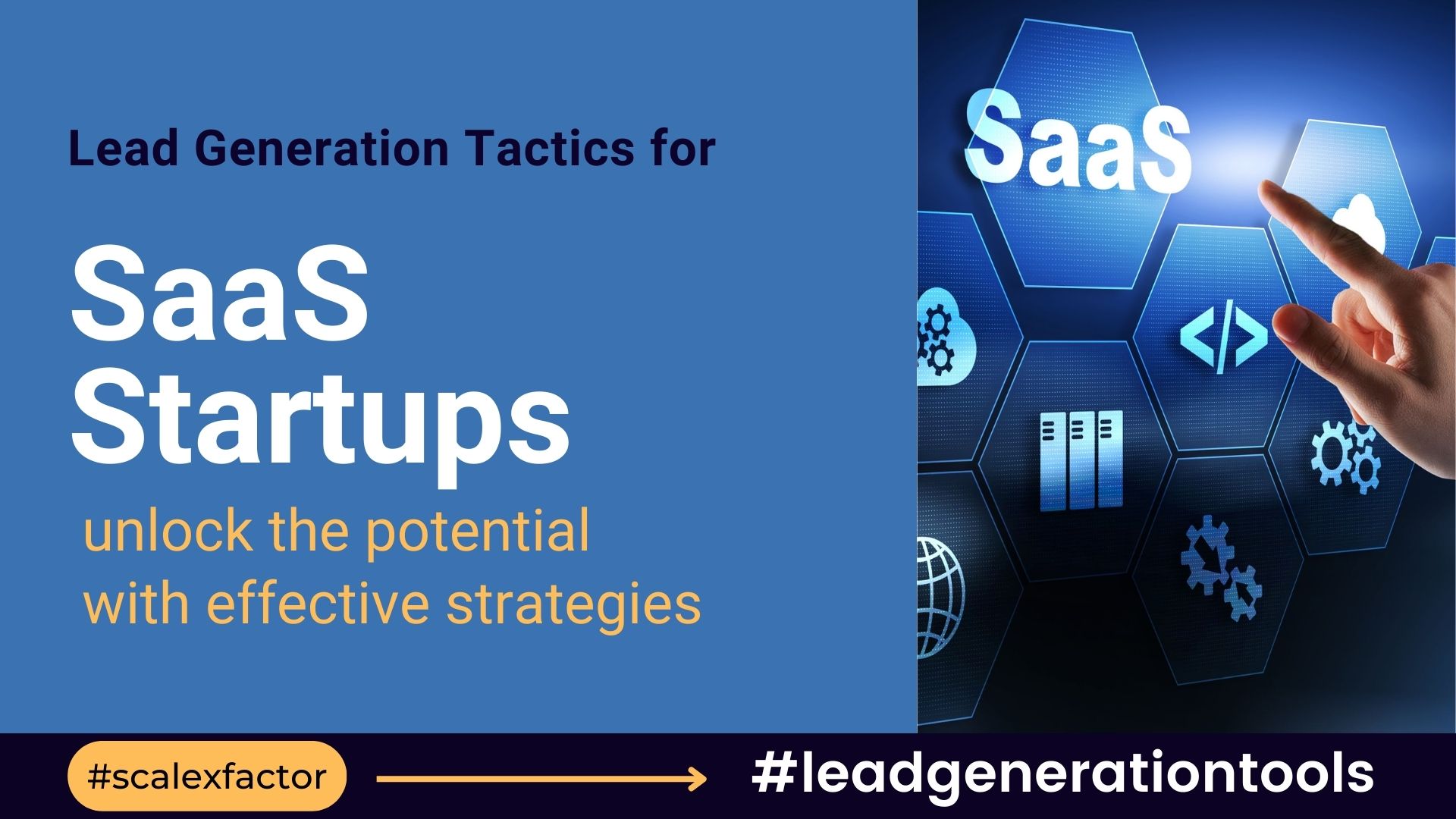As a Software as a Service (SaaS) startup, one of your primary goals is to attract potential customers and generate leads for your business. However, in a crowded digital landscape, standing out and reaching the right audience can be challenging. In this article, we’ll explore 15 effective lead generation tools tactics for SaaS startups. Lead Generation Tactics for SaaS Startups with lead generation tools is best to identifying and targeting relevant & potential customers, those search or using for products or services like yours.

Conducting Comprehensive Keyword Research
To optimize your content for lead generation, start by conducting comprehensive keyword research:
- Keyword Planner Tools: Utilize tools like Google Keyword Planner, SEMrush, or Ahrefs to discover relevant keywords and their search volumes.
- Long-Tail Keywords: Identify long-tail keywords that have lower competition but higher intent, as they are more likely to attract motivated leads.
- Competitor Analysis: Analyze your competitors’ content to identify keywords they are targeting successfully.
Creating SEO-Friendly Blog Posts
Blogging is a powerful way to attract and engage your target audience. Here’s how to create SEO-friendly blog posts:
- Keyword Integration: Incorporate target keywords naturally into your blog titles, headers, and throughout the content.
- Quality Content: Focus on creating high-quality, informative content that answers your audience’s questions and provides value.
- Internal Linking: Link to other relevant blog posts or pages on your website to keep visitors engaged and encourage them to explore more.
Crafting Compelling Landing Pages
Landing pages play a crucial role in lead generation. Follow these tips to optimize your landing pages for keywords:
- Clear Call-to-Action: Design a clear and compelling call-to-action that encourages visitors to take the desired action, such as signing up for a free trial or requesting a demo.
- Keyword-Optimized Headlines: Use your target keywords in the headlines and subheadings of your landing pages to signal relevance to search engines.
- Streamlined Forms: Keep lead capture forms short and straightforward to increase conversion rates.
Creating Irresistible Lead Magnets
Lead magnets are valuable resources offered to visitors in exchange for their contact information. Optimize your lead magnets with keywords to attract the right audience:
- Keyword-Rich Titles: Craft attention-grabbing titles that incorporate relevant keywords.
- Content Relevance: Ensure that your lead magnet content aligns with the keywords and addresses your audience’s pain points.
- Prominent CTAs: Place clear call-to-action buttons on your lead magnet landing pages to encourage conversions.
Implementing On-Page SEO Techniques
On-page SEO plays a vital role in optimizing your content for search engines:
- Meta Tags and Descriptions: Optimize meta tags and descriptions with target keywords to improve click-through rates.
- Image Alt Text: Use descriptive alt text for images, incorporating keywords where relevant.
- Structured Data Markup: Implement structured data markup to provide search engines with more information about your content.
Embracing Video Content with Keywords
Video content is gaining popularity, and optimizing it with keywords can boost lead generation:
- Keyword-Rich Video Titles: Use target keywords in your video titles to improve discoverability on platforms like YouTube.
- Keyword Tags: Include relevant keywords as tags when uploading videos to video-sharing platforms.
- Transcriptions and Closed Captions: Provide transcriptions and closed captions with keyword-rich content for better accessibility and SEO.
Utilizing Social Media for Keyword Reach
Social media platforms offer opportunities to expand your reach using keywords:
- Keyword Research for Social Media: Conduct keyword research specific to social media platforms to identify popular terms and hashtags.
- Optimized Social Media Profiles: Use target keywords in your social media profiles and bios.
- Engaging Content with Keywords: Create engaging social media posts that incorporate relevant keywords to attract attention and drive traffic.
Running Keyword-Focused PPC Campaigns
Pay-Per-Click (PPC) campaigns can complement your organic efforts by Google Ads:
- Keyword Selection: Choose the right keywords for your PPC ads to target the most relevant audience.
- Ad Copy Optimization: Incorporate keywords into your ad copy to improve relevance and click-through rates.
- Landing Page Relevance: Ensure that the landing pages for your PPC ads align with the keywords used in the ads.
Implementing Local SEO Strategies
For SaaS startups targeting local audiences, local SEO is essential:
- Google My Business: Optimize your Google My Business listing with accurate information, including relevant keywords.
- Local Keywords: Use location-based keywords to target users searching for SaaS solutions in specific areas.
- Customer Reviews and Testimonials: Encourage customers to leave positive reviews and testimonials with relevant keywords.
Partnering with Influencers and Industry Leaders
Collaborating with influencers and industry leaders can amplify your reach and improve your SEO:
- Influencer Outreach: Partner with influencers who align with your target audience and product.
- Guest Blogging: Contribute guest posts to authoritative websites in your industry, including relevant keywords in the content.
- Backlink Building: Acquire backlinks from reputable websites to boost your SEO rankings.
Conducting Webinars and Online Events
Webinars and online events are excellent opportunities for lead generation:
- Keyword-Rich Webinar Titles: Use relevant keywords in your webinar titles and descriptions to attract the right audience.
- Content Relevance: Ensure that your webinar content aligns with the keywords and offers valuable insights to attendees.
- Follow-Up with Keywords: Incorporate relevant keywords in follow-up emails to nurture leads after the event.
Harnessing the Power of Email Marketing with Keywords
Email marketing remains a powerful tool for lead nurturing:
- Segmentation with Keywords: Segment your email list based on user interests and actions related to specific keywords.
- Keyword-Optimized Subject Lines: Use relevant keywords in email subject lines to increase open rates.
- Personalized Content with Keywords: Craft personalized email content that addresses user needs and includes relevant keywords.
Analyzing and Optimizing Lead Generation Performance
Continuously analyze and optimize your lead generation efforts:
- Data-Driven Decisions: Use keyword lead generation tools to analyze data and make informed marketing decisions.
- A/B Testing: Conduct A/B testing on landing pages, emails, and ads to identify the most effective keywords and strategies.
- Conversion Rate Optimization: Optimize your lead capture forms and landing pages based on keyword performance.
Staying Updated with Keyword Trends
Keywords and search trends evolve, so it’s essential to stay updated, Google Trends can be good tools:
- Continuous Research: Regularly conduct keyword research to identify emerging trends and opportunities.
- Industry News and Updates: Keep track of industry news and changes in search engine algorithms.
- Competitor Analysis: Monitor your competitors’ keyword strategies to stay ahead of the competition.
Conclusion
Optimizing your content for lead generation using keyword lead generation tools is essential for the success of your SaaS startup. Conduct comprehensive keyword research, create SEO-friendly blog posts and landing pages, and leverage lead magnets to attract qualified leads. Implement on-page SEO techniques, embrace video content with keywords, and utilize social media for keyword reach. Run PPC campaigns, focus on local SEO, and collaborate with influencers to expand your reach. Conduct webinars and online events, harness the power of email marketing with keywords, and continuously analyze and optimize your lead generation performance. By staying updated with keyword trends and strategies, you can ensure your SaaS startup thrives in a competitive market.




